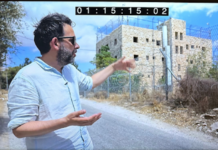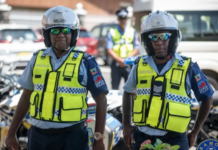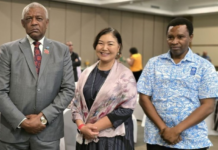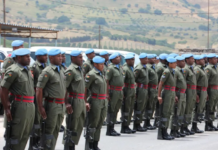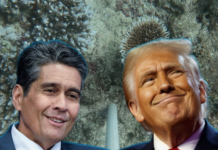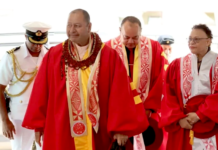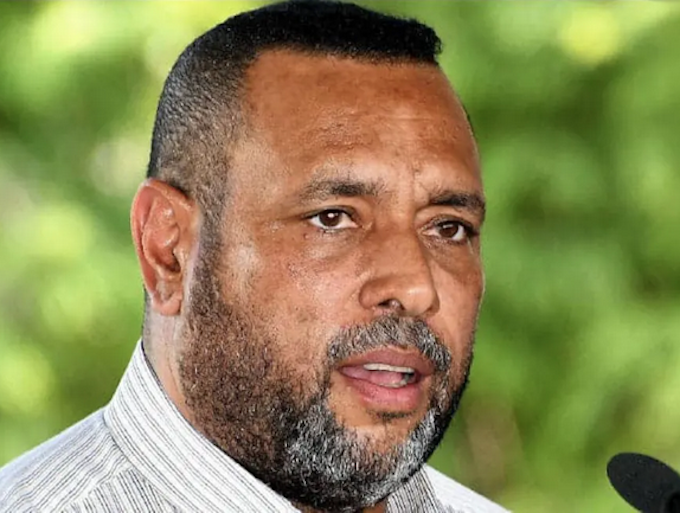
Interview by Don Wiseman, RNZ Pacific senior journalist
The man being touted by the opposition as the next leader of Papua New Guinea says the first thing his administration would do is put more focus on law and order.
East Sepik governor Allan Bird is being put forward as the opposition’s candidate for prime minister with a vote on a motion of no confidence likely in the last week of May.
Bird is realistic about his chances but he said it is important to have such a vote.
“I think the first thing we would do is just restructure the Budget and put more focus on things like law and order, bring that right to the top and deal with it quickly,” he said.
He spoke about what he aspires to do if he gets the chance.
Don Wiseman: Mr Bird, you had been delegated to look at the violence following the 2022 election, and it is clear that resolving this will be a huge problem.
AB: Not necessarily. It’s currently confined to the upper Highlands part of the country, but it is filtering down to Port Moresby and other places. I guess the reluctance to deal with the violence is that I’d say 90 percent of that violence stems from the aftermath of the elections.
From our own findings, we know that many leaders in that part of the world that run for elections actually use these warlords to help them get elected. And obviously, they’ve got like four years of downtime between elections, and this is how they spend their spare time. So, it’s hardly surprising.
I think our military and our police have the capability to deal with these criminal warlords and put them down. How shall I say it – with extreme prejudice. But you get a lot of interference in the command of the police and the Defence Force. I suspect that changes the operational orders once they get too close to dealing with these terrorists.
DW: Police have been given the power to use lethal force, but a lot of commentators would say the problems have more to do with the the lack of money, the lack of opportunity, the lack of education.
AB: The lack of education, opportunity, and things like that will play a small part. But again, as I said, I come from a province where we don’t have warlords running around heavily armed to the teeth. I mean, you have got to remember an AR-15, or a 4M, or anything like that. These things on the black market cost around 60,000 to 70,000 kina (NZ$20,000-25,000).
The ordinary Papua New Guinean cannot afford one of those things and guns are banned in public use — they’ve been banned for like 30 years. So how do these weapons get in? Just buying a bullet to operate one of these things is hard enough. So you got to ask yourself the question: how are illiterate people with perhaps no opportunity, able to come into possession of such weapons.
DW: The esteemed military leader Jerry Singarok compiled, at the request of the government about 15 years ago, a substantial report on what to do about the gun problem. But next to nothing of that has ever been implemented. Would you go back to something like that?
AB: Absolutely. I have a lot of respect for Major-General Singarok. I know him personally as well. We have had these discussions on occasions. You’ve got smart, capable people who have done a lot of work in areas such as this, and we just simply put them on the backburner and let them collect dust.
DW: The opposition hopes to have its notice for a motion of no confidence in the Marape government in Parliament on 28 or 29 May, when Parliament resumes. It was adjourned two weeks ago when the opposition tried to present their motion, with the government claiming it was laden with fake names, something the opposition has strenuously denied. Do you have the numbers?
AB: Obviously we’re talking with people inside the government because that’s where the numbers are. Hence, we’ve been encouraged to go ahead with the vote of no confidence. The chance of maybe being Prime Minister per se, is probably like 5 percent. So it could be someone else.
I say that because in Papua New Guinea, it’s really difficult for someone with my background and my sort of discipline and level of honesty to become prime minister. It’s happened a couple of times in the past, but it’s very rare.
DW: You’re too honest?
AB: I’m too honest. Yes.
DW: We’ve looked at the law and audit issue. What else needs fixing fast?
Well, we’ve got a youth bulge. We’ve got a huge population problem. We’ve got to start looking at practical ways in terms of how we can quickly expand opportunities to use your word. Whatever we’ve been doing for the last 10 years has not worked. We’ve got to try something new.
My proposal is actually really keeping with international management best practice. You go to any organisation this is what they do. I think New Zealand does it as well, and Australia does, which is you’ve got to push more funds and responsibilities closer to the coalface and that’s the provinces.
If I could do one thing that would change the trajectory of this country, it’s actually to push more resources away from the centralised government. We actually have a centralised system of government right now.
The Prime Minister [Marape] has so much control to the point where it’s up to him to authorise the building of a road in a particular place worth, say, 5 million kina. The national government is the federal government, if you like, is looking after projects that are as low as say, 2 to 3 million New Zealand dollars in value all the way up to projects that are $500 million in value.
So the question is: there’s got to be better separation of powers, better separation of responsibilities and, of course, clearly demarcated roles and responsibilities. Right now, we’re all competing for the same space. It’s highly inefficient with duplicating a lot of things and there’s a lot of wastage of resources. The way to do that is to decentralise.
DW: What concerns do you have about MPs having direct control over significant amounts of these funds that are meant to go to their electorates? Should they?
AB: Well, I don’t think any of us should have access to direct funding in that regard. However, this is the prevailing political culture that we live in. So again, coming back to my idea about ensuring that we get better funding at the sub-national levels is to strengthen the operational capability of the public servants there, so that once they start to perform, then hopefully over time, there’ll be less of a need to directly give funds to members of parliament because the system itself will start functioning.
We’ve killed the system over the last 20 or 30 years and so now the system is overly dependent on one individual which is wrong.
This article is republished under a community partnership agreement with RNZ.






